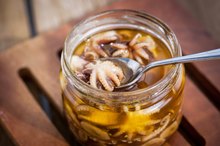What does fact checked mean?
At Healthfully, we strive to deliver objective content that is accurate and up-to-date. Our team periodically reviews articles in order to ensure content quality. The sources cited below consist of evidence from peer-reviewed journals, prominent medical organizations, academic associations, and government data.
The information contained on this site is for informational purposes only, and should not be used as a substitute for the advice of a professional health care provider. Please check with the appropriate physician regarding health questions and concerns. Although we strive to deliver accurate and up-to-date information, no guarantee to that effect is made.
What Is the Difference Between a Balanced Diet & an Unbalanced Diet?
You probably know you should eat healthy foods. You have probably also heard that you should eat a balanced diet. But it's not always clear what a balanced diet is. The Harvard School of Public Health notes that what you eat is one of the most important factors in determining your overall health.
Significance
Your body is made up of trillions of individual cells that need nutrients to function properly. When cells do not function properly, disease and dysfunction can occur. According to MedlinePlus, eating a balanced diet provides the proper nutrition and energy for maintaining your body's cells, tissues and organs, which support normal growth and development. In the 2005 "Journal of Applied Physiology," an article titled "Effects of Exercise and Diet on Chronic Disease" stated that diet combined with physical activity can reduce the risk of developing numerous chronic diseases and, in many cases, can reverse existing disease 1.
- Your body is made up of trillions of individual cells that need nutrients to function properly.
- According to MedlinePlus, eating a balanced diet provides the proper nutrition and energy for maintaining your body's cells, tissues and organs, which support normal growth and development.
Carbohydrates and Protein
Octopus and Omega 3s
Learn More
The purpose of a balanced diet is to provide enough energy and nutrition for optimal growth and development. The Harvard School of Public Health states that a balanced diet includes good carbohydrates, like whole grains. Carbohydrates provide fuel for the body. An unbalanced diet would consist of a low-carbohydrate diet or a diet that is high in sugar, like sugary drinks and processed foods. The Harvard School of Public Health states that fad diets that suggest eating few or no carbohydrates mislead the public and can lead to an unhealthy diet.
The Harvard School of Public Health also notes that protein like fish, poultry, nuts and beans are the best choices for healthy protein. It mentions that the exact daily amount of protein needed by each individual is not yet known. Protein comes from both animal and plant sources and The Harvard School of Public Health states that both sources have the same health effects. An unbalanced diet would consist of too much animal protein that is high in saturated fat. Eating protein from fish and nuts in moderation will help you cut down on your saturated fat.
- The purpose of a balanced diet is to provide enough energy and nutrition for optimal growth and development.
- Eating protein from fish and nuts in moderation will help you cut down on your saturated fat.
Fat and Fiber
A balanced and healthy diet must include fat. Not just any fat, but healthy fats and oils like omega-3 fatty acids and olive oil. The Harvard School of Public Health states that you should avoid saturated fats and trans fats. It also states that the amount of fat that you eat is not as important as the types of fat you eat. An unbalanced diet would consist of a high intake of saturated and trans fats that can lead to high cholesterol and other chronic disease. MedlinePlus states that if more than 35 percent of your calories come from fat, you have an unbalanced diet. In addition it recommends having a large variety of fruits and vegetables, which provide fiber, vitamins and minerals that your body needs to function.
- A balanced and healthy diet must include fat.
- In addition it recommends having a large variety of fruits and vegetables, which provide fiber, vitamins and minerals that your body needs to function.
Considerations
Cottage Cheese and Amino Acids
Learn More
MedlinePlus organizes a balanced diet into food groups like grains, fruits, vegetables, oil, meats and beans and dairy. The Harvard School of Public Health also recommends calcium as part of a healthy and balanced diet, but it states that calcium-rich nondairy foods include leafy green vegetables and broccoli and these may be better than dairy products. An unbalanced diet would tend to not focus on food groups and lean toward too much sodium, few vegetables and fruits, high intake of saturated fats and processed foods and high intake of refined grains and sugar.
Balanced vs. Unbalanced
MedlinePlus states that an unbalanced diet can lead to problems with maintenance of your body's tissues, problems with brain and nervous system function, impaired growth and development and problems with bone and muscle systems. An unbalanced diet is one that is too focused on one food group or is too heavy on processed foods. MedlinePlus also states that the term "balanced diet" simply means meeting your nutritional needs while not providing too much of any single nutrient. It states that you can achieve this by eating a variety of foods from each of the food groups.
- MedlinePlus states that an unbalanced diet can lead to problems with maintenance of your body's tissues, problems with brain and nervous system function, impaired growth and development and problems with bone and muscle systems.
- MedlinePlus also states that the term "balanced diet" simply means meeting your nutritional needs while not providing too much of any single nutrient.
Related Articles
References
Writer Bio
Brady Williams is a third-generation chiropractor who has been writing and lecturing on topics in health, nutrition, chiropractic, sports medicine and wellness since 2006. He holds a Bachelor of Science in general science and a Doctor of Chiropractic from Palmer College of Chiropractic. He also holds a Master of Science in sport science and rehabilitation from Logan University.









